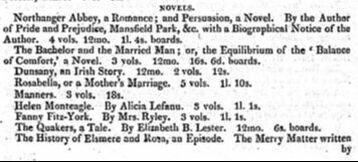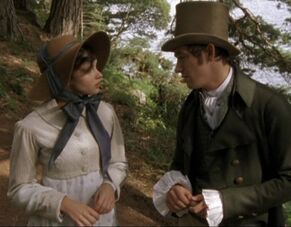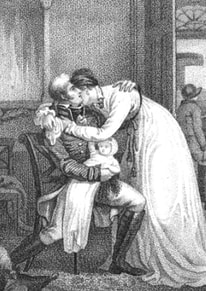| It's Ann Ryley week at Clutching My Pearls! A new post every day about Ann Ryley (1760-1823), a forgotten novelist, and her novel Fanny Fitz-York, which was not reviewed when it was first published. For more reviews of obscure and forgotten novels, click "Authoresses" and "Books Unreviewed Til Now" at the right. I'm excited to introduce author Ann Ryley to you... |
| |
 A listing of new novels for 1818 in The Quarterly Review includes Austen's two last novels and Ryley's Fanny Fitz-York
A listing of new novels for 1818 in The Quarterly Review includes Austen's two last novels and Ryley's Fanny Fitz-York Fanny Fitz-York came out in late 1817, the same time as Jane Austen's posthumous novels Northanger Abbey and Persuasion (though all are officially designated as having been published in 1818). Author Ann Ryley was 58 years old when her novel was published, so I've got some kindred feeling for her. I'll share more of her life story later this week.
The Dictionary of National Biography entry for Ann's husband R.W. Ryley described Fanny Fitz-York as a "successful" novel but the only thing approaching to a review or reaction that I've found is a brief paragraph from 1860. Richard Wright Proctor, a literary historian and travel writer, called Fanny Fitz-York “a cleverly-written novel, of considerable interest, especially to women." He added, "though Fanny Fitz-York is now unknown to the majority of readers, who, in their eager pursuit of something new, are apt to overlook the treasures of the past, it still has an abiding place in the circulating library. Here the curious may find this slighted heroine of romance, this forgotten belle of a season, taking her natural rest, half buried in kindred dust, and literally shelved...”
Should we wake Fanny Fitz-York from her slumbers? I think so, given the current academic focus on the social and historical context of novels, as opposed to intrinsic literary merit. Which is not to say Ryley is a mediocre writer; I think she's better than many of her contemporaries. And she holds up much better than her husband, who published five volumes of memoirs clogged with clichés: “A fortnight ago, seated in my cottage, enjoying the height of human felicity—peaceful, domestic, rural comfort—now on my way to the metropolis, preparing to merge into the vortex of public life, and plunge into the troubled sea of dramatic misery!”
Ryley hasn't gotten any attention from scholars but I think she's worth studying because she offers a striking contrast to Jane Austen, for reasons I'll explain.
But first, a bit about the story itself...







 RSS Feed
RSS Feed